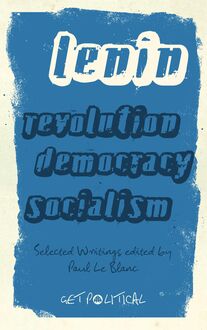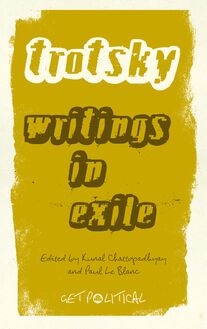Revolution, Democracy, Socialism , livre ebook
221
pages
English
Ebooks
2008
Vous pourrez modifier la taille du texte de cet ouvrage
Obtenez un accès à la bibliothèque pour le consulter en ligne En savoir plus
Découvre YouScribe en t'inscrivant gratuitement
Découvre YouScribe en t'inscrivant gratuitement
221
pages
English
Ebooks
2008
Vous pourrez modifier la taille du texte de cet ouvrage
Obtenez un accès à la bibliothèque pour le consulter en ligne En savoir plus
Publié par
Date de parution
20 septembre 2008
Nombre de lectures
2
EAN13
9781783710775
Langue
English
Poids de l'ouvrage
1 Mo
This is an entirely new collection of Lenin's writing. For the first time it brings together crucial shorter works, to show that Lenin held a life-long commitment to freedom and democracy. Le Blanc has written a comprehensive introduction, which gives an accessible overview of Lenin's life and work, and explains his relevance to political thought today.
Lenin has been much maligned in the mainstream, accused of viewing 'man as modeling clay' and of 'social engineering of the most radical kind.' However, in contrast to today's world leaders, who happily turn to violence to achieve their objectives, Lenin believed it impossible to reach his goals 'by any other path than that of political democracy.'
This collection will be of immense value to students encountering Lenin for the first time, and those looking for a new interpretation of one of the 20th century's most inspiring figures.
TEN REASONS FOR NOT READING LENIN
by Paul Le Blanc
1. Lenin
2. Lenin's Critics
3. His Time and Ours
4. Further Reading
LENIN'S SELECTED WRITINGS, 1895-1923
I. Marxist Program and Revolutionary Organization
1. 1895-6: Draft and Explanation of a Program of the Social Democratic Party
2. 1897-9: The Development of Capitalism in Russia
3. 1899: Our Program
4. 1899: Our Immediate Task
5. 1899: Fuse Socialism with the Workers' Movement
II. Birth of Bolshevism
6. 1900: The Urgent Tasks of Our Movement
7. 1902: What Is To Be Done?
8. 1903: To the Rural Poor
9. 1904: One Step Forward, Two Steps Back: Reply to Rosa Luxemburg
10. 1904: Against Subordination to Liberals
III. 1905: Challenges of the Revolutionary Upsurge
11. 1905: The Beginning of the Revolution in Russia
12. 1905: A Militant Agreement for the Uprising
13. 1905: Two Tactics of Social Democracy in the Democratic Revolution
14. 1905: Our Tasks and the Soviet of Workers Deputies
15. 1905: Socialism and Religion
IV. Creation of the Bolshevik Party
16. 1906: Freedom to Criticise and Unity of Action
17. 1909: Break with Ultra-Left Bolsheviks
18. 1912: Final Break with the Mensheviks
19. 1914: Report to Brussels
V. Imperialist War, National Liberation, Revolutionary Democracy
20. 1913: The Historical Destiny of the Doctrine of Karl Marx
21. 1915: Socialism and War
22. 1915: The Revolutionary Proletariat and the Right of Nations to Self-Determination
23. 1916: Imperialism, The Highest Stage of Capitalism
24. 1917: Statistics and Sociology
VI. 1917 Revolution
25. 1917: Letters on Tactics
26. 1917: The State and Revolution
27. 1917: To the Population: Take Power in Your Own Hands
28. 1918: Dissolution of the Constituent Assembly
VII. World Revolution
29. 1918: Letter to American Workers
30. 1919: The Third International and Its Place in History
31. 1920: Left-Wing Communism, An Infantile Disorder
32. 1921: Speech on Tactics of the Communist International
VIII. Reaching for Socialism, Resisting Bureaucracy
33. 1919: Tasks of the Working Women's Movement
34. 1919: Comments to Congress on Adult Education
35. 1920: On the Trade Unions
36. 1921: The Party Crisis
37. 1923: Better Fewer, But Better
Index
Publié par
Date de parution
20 septembre 2008
Nombre de lectures
2
EAN13
9781783710775
Langue
English
Poids de l'ouvrage
1 Mo
Revolution, Democracy, Socialism
www.plutobooks.com Revolution, Democracy, Socialism Selected Writings V.I. Lenin Edited by Paul Le Blanc 9780745327600 Jewish History, Jewish Religion The Weight of Three Thousand Years Israel Shahak Forewords by Pappe / Mezvinsky / Said / Vidal 9780745328409 Theatre of the Oppressed Augusto Boal 9780745328386 Black Skin, White Masks Frantz Fanon Forewords by Homi K. Bhabha and Ziauddin Sardar 9780745328485 The Communist Manifesto Karl Marx and Friedrich Engels Introduction by David Harvey 9780745328461 Catching History on the Wing Race, Culture and Globalisation A. Sivanandan Foreword by Colin Prescod 9780745328348
First published 2008 by Pluto Press
345 Archway Road, London N6 5AA
www.plutobooks.com
This collection copyright Paul Le Blanc 2008
The right of Paul Le Blanc as volume editor and author of the Introduction and Commentary to the Work has been asserted by him in accordance with the Copyright, Designs and Patents Act 1988.
British Library Cataloguing in Publication Data
A catalogue record for this book is available from the British Library
ISBN-13 978 0 7453 2761 7 Hardback
ISBN-13 978 0 7453 2760 0 Paperback
ISBN-13 978 1 7837 1077 5 ePub
Library of Congress Cataloging in Publication Data applied for
This book is printed on paper suitable for recycling and made from fully managed and sustained forest sources. Logging, pulping and manufacturing processes are expected to conform to the environmental standards of the country of origin. The paper may contain up to 70% post consumer waste.
10 9 8 7 6 5 4 3 2 1
Designed and produced for Pluto Press by
Chase Publishing Services Ltd, Sidmouth, EX10 9QG, England
Typeset by Stanford DTP Services, Northampton, England
Printed and bound in the European Union by
CPI Antony Rowe, Chippenham and Eastbourne
CONTENTS
Acknowledgements
PART ONE: INTRODUCTORY ESSAY by Paul Le Blanc
1 Ten Reasons for Not Reading Lenin
Lenin: A Succinct Biography
Lenin s Critics
His Time and Ours
Further Reading
Notes
PART TWO: LENIN S SELECTED WRITINGS, 1895-1923
2 Marxist Programme and Revolutionary Organisation
1895-96: Draft and Explanation of a Programme for the Social-Democratic Party
1897-99: The Development of Capitalism in Russia
1899: Our Programme
1899: Our Immediate Task
1899: Fuse Socialism with the Workers Movement
3 Birth of Bolshevism
1900: The Urgent Tasks of Our Movement
1902: What Is To Be Done?
1903: To the Rural Poor
1904: One Step Forward, Two Steps Back - Reply to Rosa Luxemburg
1904: Against Subordination to Liberals
4 1905: Challenges of the Revolutionary Upsurge
1905: The Beginning of the Revolution in Russia
1905: A Militant Agreement for the Uprising
1905: Two Tactics of Social Democracy in the Democratic Revolution
1905: Our Tasks and the Soviet of Workers Deputies
1905: Socialism and Religion
5 Creation of the Bolshevik Party
1906: Freedom to Criticise and Unity of Action
1909: Break with Ultra-Left Bolsheviks
1912: Final Break with the Mensheviks
1914: Report to Brussels
6 Imperialist War, National Liberation, Revolutionary Democracy
1913: The Historical Destiny of the Doctrine of Karl Marx
1915: Socialism and War
1915: The Revolutionary Proletariat and the Right of Nations to Self-Determination
1916: Imperialism, the Highest Stage of Capitalism
1917: Statistics and Sociology
7 1917 Revolution
1917: Letters on Tactics
1917: The State and Revolution
1917: To the Population - Take Power in Your Own Hands
1918: Dissolution of the Constituent Assembly
8 World Revolution
1918: Letter to American Workers
1919: The Third International and Its Place in History
1920: Left-Wing Communism, An Infantile Disorder
1921: Speech on Tactics of the Communist International
9 Reaching for Socialism, Resisting Bureaucracy
1919: Tasks of the Working Women s Movement
1919: Comments to Congress on Adult Education
1920: On the Trade Unions
1921: The Party Crisis
1923: Better Fewer, But Better
Notes
Index
This volume is dedicated:
To the memory of my father Gaston (Gus) Le Blanc, a working-class organiser who first told me about Lenin ,
To the memory of George Breitman, a revolutionary socialist scholar-activist who helped me tell others ,
To the generations of fighters for a society of the free and equal, especially those who are young and those yet to come .
ACKNOWLEDGEMENTS
A number of friends and teachers and comrades, too numerous to mention, have contributed in innumerable ways to my ability and desire to help create this book.
Among those who offered direct encouragement and/or challenges and ideas are Anthony Arnove, Samantha (Sam) Ashman, Dennis Brutus, Sebastian Budgen, Nancy Ferrari, Geoffroy de Laforcade, Lars Lih, Michael L wy, Michael Matambanadzo, Kevin Murphy, Immanuel Ness, August Nimtz, Bryan Palmer, Pierre Roussett, Helen Scott, George Shriver, and Michael Yates.
I am indebted to David Castle, Robert Webb, Alec Gregory and their colleagues at Pluto Press, and to Ray Addicott and Oliver Howard of Chase Publishing Services. Assistance of the staff of the Wright Library at La Roche College, and the intellectual engagement of many academic colleagues and students of that institution have helped sustain my efforts.
I have been especially inspired by activists with whom I have had the pleasure of working in Pittsburgh - particularly those who are members of the Anti-War Committee of the Thomas Merton Center, the International Socialist Organization, Solidarity, and the Workers International League.
I have been privileged, as well, to have been able to meet and draw strength from partisans of socialism while in Belgium, Brazil, Britain, Canada, China, France, India, Italy, the Netherlands, Nicaragua, and South Africa - and, along with those I know in the United States, they have brought to life for me, in their aspirations and struggles, much of the meaning of Lenin s own aspirations and struggles.
Part One: Introductory Essay
1
TEN REASONS FOR NOT READING LENIN
Paul Le Blanc
Lenin walks around the world,
Black, brown and white receive him.
Language is no barrier.
The strangest tongues believe him.
Langston Hughes 1
This book draws together writings from someone generally acknowledged to have been one of the greatest revolutionary theorists and organisers in human history: Vladimir Ilyich Ulyanov, whose intimates knew him affectionately as Ilyich , but whom the world knew by his underground pseudonym - Lenin. He was the leader of the Bolshevik wing of the Russian socialist movement, and this wing later became the Russian Communist Party after coming to power in 1917 through a violent revolution (though less violent than the French Revolution or the American Civil War).
For millions he was seen as a liberator. Appropriated after his death by bureaucrats and functionaries in order to legitimate their tyranny in countries labelled Communist , he was at the same time denounced for being a wicked and cruel fanatic by defenders of power and privilege in capitalist countries - and with Communism s collapse at the close of the Cold War it is their powerful voices that achieved global domination. This book challenges that.
Lenin lived and died long ago, so one could ask why we should bother reading him in our very different world. This is indeed a good question. Here are ten good reasons for not reading Lenin:
1. The world is as it should be and all is going well.
2. Freedom, creative opportunities, and community exist for all.
3. Each person has a decisive say in the decisions affecting his or her life.
4. Oppression and exploitation do not exist.
5. The unequal structure of wealth and power in our society and in our world has nothing to do with the problems of humanity.
6. It is easy to figure out how to make the world a better place.
7. The history of struggles by workers and oppressed people is a waste of time.
8. The popular revolution of 1917 in Russia was a meaningless diversion.
9. It s good just to rely on what others say about someone as complex as Lenin.
10. Realities of the present and possibilities for the future have nothing to do with what happened in the past.
You may find the present volume helpful, however, if you reject these ten propositions. To reject the propositions does not mean that Lenin is right about everything, of course - but it does suggest that his ideas may have relevance for those developing an understanding of our history and our time.
The interpretation of Leninism repeated over and over and over by liberals and conservatives goes like this: Lenin was the architect of a party of a new type - the revolutionary vanguard party, led by Marxist intellectuals who were determined to use the working masses as a battering ram to take political power to bring about a total transformation of humanity - with predictably inhuman results. 1
Indeed there are even Marxist-influenced democratic socialists who would argue that whoever wants to reach socialism by any other path than that of political democracy will inevitably arrive at conclusions that are absurd and reactionary both in the economic and political sense . Are these the words of Keir Hardie or Rosa Luxemburg or Michael Harrington? No. Actually, these are the words of Lenin himself. 2
There are other collections of Lenin s writings, but this one is organised for the purpose of highlighting the commitment to freedom and democracy that runs through his political thought from beginning to end. It also stresses his coherent analytical, strategic, and tactical orientation that retains some relevance for our own age of globalisation . It is hoped that this volume can help scholars and students comprehend more clearly the early strength and success of Lenin s Bolsheviks. Both the grandeur and the tragedy of the Russian Revolution and the early years of Communism can thereby be thrown into bold re






